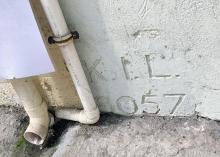05 Apr 1944, John Charter's wartime journal
Primary tabs
Maudie and Vera Murrell had undertaken the unenviable task of Properties and Stage Managers and had slaved away, begging, borrowing and arranging until they had collected the props for a very convincing suburban living room. On Wed 19th we had our full-dress rehearsal. In the meantime, as a precaution against night raids, the Japanese had ordered a complete blackout after sundown during the second and third quarters of the lunar month. This was the first of a series of blackouts that have continued ever since and, of course, it had to fall on the date of our production! However, Mr Nakasawa assured us that the blackout would be lifted by Thurs 20th, as by that day the moon did not rise till after 10 p.m., by which time the camp lights are always turned out. Anxiously we awaited news, but by Thurs morning there was still no news of the blackout being off. This meant we could either start the play in time to finish it before sundown – say 4.45 p.m., or postpone it yet again.
However, Margrett settled the question for us by developing a severe bout of malaria on Wednesday night. He woke up with a high temperature and a violent rigor. Mrs Margrett came to break the news to me and said that Dr Talbot had told him he could dope him sufficiently to bring his temp down for that night but, as with malaria, one’s temperature is usually up one night and down the next, it is probable that he would not have been available on the Friday night. So once more we decided to postpone; this time till after Xmas.
Eventually the play was performed on Thurs, Fri and Sat of Dec 30, 31st and Jan 1st. We had Bow Bells and Auld Lang Syne on the Fri night, after the final curtain which was quite fun. On the whole I think the production was quite a success, though I would by no means call it inspired. I think it is a mistake to produce an ordinary modern play twice. I found that instead of approaching it with a completely fresh mind one is apt to try and think back to the first production and try and remember what was done there, and the second production therefore tends to lack inspiration. Yvonne did very well in a somewhat colourless part. Old Phil was really quite good though his diction was poor. He could either speak slowly and distinctly or, fairly fast and incoherently, but never fast and distinctly! The only person who was at all adversely criticised was Mrs Hyde-Lay. Curiously enough, the cast and I thought she filled the bill very well. It was the first play she had ever acted in, so any short comings on her part were probably my responsibility.
Well, we all heaved a mighty sigh of relief when it was over and I vowed I would do nothing further in the dramatic line until next winter at the earliest. Actually I took the part of a blind shepherd in Cyril Brown’s Xmas Nativity Play and also the part of John, the disciple, in Cyril’s Easter Passion Play. They were small parts and did not entail much rehearsing. He wrote the Passion play himself and it was quite a creditable effort, though the performances did not do it justice. It was put on in too much of a hurry and at too short notice.

